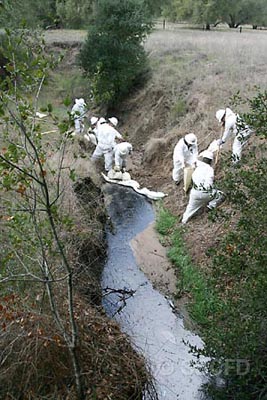Is Greka Still Spilling?
Supes Check In on Oozing Oil Company

Nearly two months have passed since Santa Barbara County Supervisors held a full-disclosure special hearing on Greka Energy and its seemingly habitual practice of spilling crude oil and produced water-an equally toxic byproduct of oil drilling-into the countryside and creeks of Santa Barbara County. This week, county staff and assorted state and federal environmental regulatory agencies returned to the board with an update.
While singing a rosier tune about Greka’s efforts to remedy its ways and improve the aged equipment at its 17 county facilities, staff also reported that despite steps forward, the company has still been responsible for 20 spills of approximately 12,000 gallons of crude and toxic water, has received notice of some 700 “deficiencies” at 12 facilities, and has had two said facilities near Santa Maria shut down. Simply put, as county Deputy CEO Ron Cortez concluded Tuesday’s hearing, “There has been a lot of progress in the past 60 days, but there is a whole lot more work still to be done.”
With the mixed bag of news came updates from California Fish and Game and the Environmental Protection Agency on clean-up efforts currently underway at several spill sites dating back to early last December. According to George Gross of Fish and Game, the December 7 Palmer Road leak has been sufficiently cleaned up and, based on final numbers, released some 2,181 barrels of oil into the surrounding area despite initial reports that only 40 had spilled.
As for the Zaca Station spill from early January, Gross said, the roughly 200,000 gallons of spilled oil and produced water has all since been cleaned up, and restoration efforts on the property and affected creek are currently underway. However, clean-up efforts for late January’s Bradley 3 Island incident, which appears to have affected federally protected Tiger salamander breeding grounds, have not yet begun.
Explaining his organization’s efforts, EPA site coordinator Robert Wise recounted more than a few times when the company had been told to prepare a specific area prior to foul weather but had failed to do so and therefore caused a spill in that very spot. Additionally, Wise explained that the EPA has issued Greka three separate clean-up orders with hard and fast deadlines. If they are not met, Greka could end up facing fines of $32,500 per day and $3,000 per barrel. “Our attorneys are currently working on what type of specific action will be taken.” Wise explained. “The EPA will be here until the end. We are not going away anytime soon.”
Greka spokesperson Robert O’Brien told the board about his company’s late February operational decision to staff its facilities 24 hours a day, seven days a week, as opposed to the prior eight-hour workdays. He explained that Greka has begun the permitting process to build concrete block walls along the existing dirt berms that protect creeks from spilling toxins at the Bell and Zaca stations where current berms failed to protect the creeks during prior mishaps. Finally, O’Brien noted that Greka’s seemingly high number of spills results from the fact that they own a vast majority of the county’s oil wells. “Greka is operating like every other operator in the county. When you look at the number of total spills per wellhead, Greka remains in the middle of the pack.” O’Brien said.
Flying under the flag of an all encompassing “on-shore oil facilities update,” Tuesday’s hearing was also a show-and-tell of sorts about the county’s new approach to monitoring oil companies. Since mid January, County Fire and Petroleum Unit officials have been conducting facility inspections twice a week and will continue to do so until they have visited all the county’s on-shore oil outposts. County staff will next return to the supervisors in May with another round of updates, at which time they hope to have fleshed out actual ordinances designed to help recoup clean-up and inspection costs as well as crack down on repeat offenders.



